Lack of sleep link to anxiety in children, study shows
Joe Lepper
Monday, February 4, 2019
Lack of sleep is fuelling anxiety levels among schoolchildren, a survey by a mental health charity has found.

The survey of almost 1,000 pupils aged 10 and 11 and 13 and 14 found that those who get less than the recommended nine hours' sleep on a school night are more likely to worry about issues at school and home.
Almost a third of those affected by lack of sleep said they felt worries get in the way of their school work, compared with 22 per cent of those who sleep well, the survey by mental health charity Place2Be found.
Among those with lack of sleep, 22 per cent said they don't know how to cope with anxiety, compared with 18 per cent of sound sleepers.
In addition, 36 per cent of those with sleep issues said that once they start worrying they cannot stop, while the proportion among those who regularly sleep well is 28 per cent.
Most of the 975 children in years 6 and 9 across 24 primary and secondary schools who were surveyed get to sleep within 30 minutes of going to bed. However, it takes a fifth between one and two hours to fall asleep and more than two hours for eight per cent.
The top concern among pupils is exams and tests, which was mentioned by 50 per cent, closely followed by friends (49 per cent), family (42 per cent) and not doing well at school (42 per cent).
Bad things happening in the world was mentioned as a worry for 39 per cent of children.
Anxiety levels increase between years 6 and 9, the survey also found, in particular around their appearance. The way they look was cited as a worry among 36 per cent of 13- and 14-year-olds, but only mentioned by 17 per cent of 10- and 11-year olds.
Coping strategies around anxiety cited by children include talking to a member of their family, spending time on their own or watching films.
These tactics differed markedly though between girls and boys. Girls are more likely to read or listen to music, while boys are more likely to play computer games and exercise.
"At least three children in every class have a diagnosable mental health issue, and many more worry about everyday concerns from exams to family life," said Place2Be chief executive Catherine Roche.
She added: "Further research is needed to explore if children are lacking sleep because they worry, or worry because they aren't getting enough sleep."
The research has been released to coincide with Children's Mental Health Week (4-10 February).
See the latest edition of CYP Now to read a feature on the impact that lack of sleep can have on children's wellbeing and what professionals are doing to address this.




